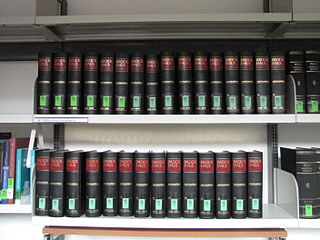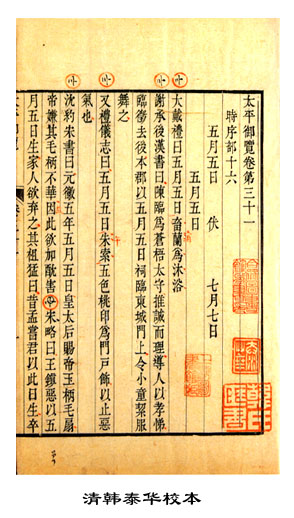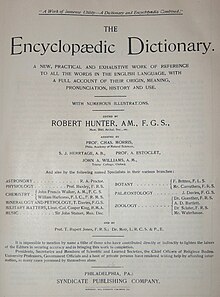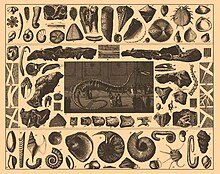
A dictionary is a listing of lexemes from the lexicon of one or more specific languages, often arranged alphabetically, which may include information on definitions, usage, etymologies, pronunciations, translation, etc. It is a lexicographical reference that shows inter-relationships among the data.

An encyclopedia or encyclopaedia is a reference work or compendium providing summaries of knowledge, either general or special, in a particular field or discipline. Encyclopedias are divided into articles or entries that are arranged alphabetically by article name or by thematic categories, or else are hyperlinked and searchable. Encyclopedia entries are longer and more detailed than those in most dictionaries. Generally speaking, encyclopedia articles focus on factual information concerning the subject named in the article's title; this is unlike dictionary entries, which focus on linguistic information about words, such as their etymology, meaning, pronunciation, use, and grammatical forms.

The Encyclopædia Britannica is a general knowledge English-language encyclopaedia. It has been published by Encyclopædia Britannica, Inc. since 1768, although the company has changed ownership seven times. The encyclopaedia is maintained by about 100 full-time editors and more than 4,000 contributors. The 2010 version of the 15th edition, which spans 32 volumes and 32,640 pages, was the last printed edition. Since 2016, it has been published exclusively as an online encyclopaedia.
Lexicography is the study of lexicons, and is divided into two separate academic disciplines. It is the art of compiling dictionaries.

A reference work is a non-fiction work, such as a paper, book or periodical, to which one can refer for information. The information is intended to be found quickly when needed. Such works are usually referred to for particular pieces of information, rather than read beginning to end. The writing style used in these works is informative; the authors avoid opinions and the use of the first person, and emphasize facts.

A glossary, also known as a vocabulary or clavis, is an alphabetical list of terms in a particular domain of knowledge with the definitions for those terms. Traditionally, a glossary appears at the end of a book and includes terms within that book that are either newly introduced, uncommon, or specialized. While glossaries are most commonly associated with non-fiction books, in some cases, fiction novels sometimes include a glossary for unfamiliar terms.

Encyclopedism is an outlook that aims to include a wide range of knowledge in a single work. The term covers both encyclopedias themselves and related genres in which comprehensiveness is a notable feature. The word encyclopedia is a Latinization of the Greek enkýklios paideía, which means all-around education. The encyclopedia is "one of the few generalizing influences in a world of overspecialization. It serves to recall that knowledge has unity," according to Louis Shores, editor of Collier's Encyclopedia. It should not be "a miscellany, but a concentration, a clarification, and a synthesis", according to British writer H. G. Wells.

Cyclopædia: or, An Universal Dictionary of Arts and Sciences is a British encyclopedia prepared by Ephraim Chambers and first published in 1728; six more editions appeared between 1728 and 1751 with a Supplement in 1753. The Cyclopædia was one of the first general encyclopedias to be produced in English.

Lexicon Technicum: or, An Universal English Dictionary of Arts and Sciences: Explaining not only the Terms of Art, but the Arts Themselves was in many respects the first alphabetical encyclopedia written in English, compiled by John Harris, with the first volume published in 1704 and the second in 1710. Although the emphasis of the Lexicon Technicum was on mathematical subjects, its contents go beyond what would be called science or technology today, in conformity with the broad eighteenth century understanding of the terms "arts" and "science," and it includes entries on the humanities and fine arts, notably on law, commerce, music, and heraldry. However, the Lexicon Technicum neglects theology, antiquity, biography, and poetry.

Chinese encyclopedias comprise both Chinese language encyclopedias and foreign language ones about China or Chinese topics. There is a type of native Chinese reference work called leishu that is sometimes translated as "encyclopedia", but although these collections of quotations from classic texts are expansively "encyclopedic", a leishu is more accurately described as a "compendium" or "anthology". The long history of Chinese encyclopedias began with the Huanglanleishu and continues with online encyclopedias such as the Baike Encyclopedia.

MicrosoftEncarta is a discontinued digital multimedia encyclopedia published by Microsoft from 1993 to 2009. Originally sold on CD-ROM or DVD, it was also available online via annual subscription, although later articles could also be viewed for free online with advertisements. By 2008, the complete English version, Encarta Premium, consisted of more than 62,000 articles, numerous photos and illustrations, music clips, videos, interactive content, timelines, maps, atlases and homework tools.
The following outline is provided as an overview of and topical guide to knowledge:
The Institute of Encyclopaedic Researchof the National Academy of Sciences of Ukraine is a Ukrainian state-supported academic research and publishing organization based in Kyiv, Ukraine. 50°26′39.54″N30°30′56.91″E

Encyclopedias have progressed from the beginning of history in written form, through medieval and modern times in print, and most recently, displayed on computer and distributed via computer networks.
Encyclopaedistics or encyclopaedics as a discipline, is the academic scholarship of encyclopedias as sources of encyclopedic knowledge and cultural objects as well; in this sense, this discipline is also known as "encyclopaedia studies" and can be termed as "theoretical encyclopaediography" by analogy with theoretical lexicography. Encyclopaedistics as a practical activity also called "encyclopaedic practice" or "encyclopedism" is the process of assembling encyclopaedias available to the public for sale or for free. In this sense, it is the art or craft of writing, compiling, and editing the paper or online encyclopedias. As a practical activity, encyclopaedistics originated in the Middle Ages in connection with the development of compendiums based on alphabetical structuring. Encyclopaedistics is often defined as "the art and science of selecting and disseminating the information most significant to mankind".












